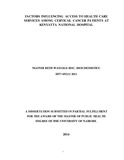| dc.contributor.author | Ngondi, Beth Wangigi | |
| dc.date.accessioned | 2014-11-25T06:10:56Z | |
| dc.date.available | 2014-11-25T06:10:56Z | |
| dc.date.issued | 2014 | |
| dc.identifier.citation | Master Of Public Health | en_US |
| dc.identifier.uri | http://hdl.handle.net/11295/75221 | |
| dc.description.abstract | Cervical cancer poses a real threat to women’s reproductive health despite it being considered
easily preventable. The disease is caused by infection with sexually transmitted Human
Papillomavirus but can be readily prevented by identifying and treating women with
precancerous lesions in the cervix. In developing countries however, lack of awareness of the
problem coupled with limited access to health interventions are responsible for the higher
mortality witnessed compared to developed countries. In Kenya, mortality rates that are as high
as morbidity rates suggest challenges in health care access for the patients. Several studies have
been done on screening uptake and prevention of cervical cancer. However, in order to reduce
the plight of those who already have the disease, there is need for studies on issues related to
access to treatment. This study was therefore conducted to describe factors that influence access
to health care services among cervical cancer patients at Kenyatta National hospital. It is the
only public facility that is currently providing radiotherapy services hence the most frequented
by those who cannot afford private hospitals or treatment overseas.
A descriptive cross sectional study was conducted of the cervical cancer patients attending the
hospital for health care. A structured questionnaire was used to collect data from the patients on
their cancer diagnosis and treatment journey. Data analysis was conducted by running
frequencies and by use of Chi square to check for associations. The results were used to check
for gaps in access to cervical cancer health services.
A total of 228 participants, selected by convenience sampling, took part. The study found cost to
be a factor that influences access to health care, in agreement with findings from other studies.
Additionally there was an association found between having health insurance and mode used for
payment (p=0.05). Geographical accessibility was found to be another influencing factor with
83.3% of the respondents having come from outside Nairobi. This also highlighted availability
of regional comprehensive cervical cancer health services as a gap that needs addressing. The
study further highlighted poor knowledge of cervical cancer. 64.5% of the respondents did not
know about cervical cancer prior to diagnosis and only 6.1% identified Human Papillomavirus
as the cause. The study findings compare well with those of a study done in Nigeria by Abiodun
et al which found only 2.3% of respondents knew of Human Papillomavirus as a cause of
cervical cancer.
Reducing cost of treatment, increasing knowledge on cervical cancer as well as introducing
comprehensive treatment facilities regionally may increase access and therefore utilization of
health care services and thereby improve outcomes for this disease. | en_US |
| dc.language.iso | en | en_US |
| dc.publisher | University of Nairobi | en_US |
| dc.title | Factors influencing access to health care services among cervical cancer patients at Kenyatta National Hospital | en_US |
| dc.type | Thesis | en_US |
| dc.description.department | a
Department of Psychiatry, University of Nairobi, ; bDepartment of Mental Health, School of Medicine,
Moi University, Eldoret, Kenya | |
| dc.type.material | en_US | en_US |

